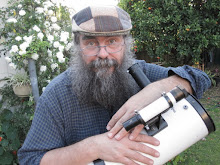Wednesday, April 16, 2008
So much irony, so little time.
By your logic, it was right for Galileo to be persecuted for his views, because the overwhelming majority of astronomers were certain that geocentrism was right and heliocentrism was wrong. The evidence was just so overwhelmingly obvious. The same goes for virtually any other scientist that revolutionized his discipline.
Can't these people get their history right? If you would have polled astronomers in 1610, after the publication of Sidereus Nuncius (The Starry Messenger) and well before Galileo fronted the inquisition or was persecuted, you would have found that most astronomers would regard the Copernican heliocentric model as computationally convenient. It made predicting planetary positions easier, having got rid of many (but not all) of the epicycles that bedeviled the Ptolemaic geocentric theory (for a series of Java animations that illustrate geocentric theory, see here). It also provided a natural explanation for retrograde planetary motion. On the other hand, stellar parallax had not been observed, and with the Copernican system there was no obvious replacement for the system of Aristotelian physics that, for example, produced gravity, so its status as an explanatory theory was not firm. However, Galileo's observations of the Medician Stars and his work on physics significantly dented Aristotelian physics, making the Aristotelian argument against Copernicanism less compelling and throwing open the geocentric question again. This was a time of great ferment in astronomy as astronomers made their own telescopes and confirmed Galileo's observations while making new observations of their own.
One thing we can definitively say about this time was that there was no consensus amongst astronomers, in the sense of our modern consensuses about relativity, quantum mechanics, evolutionary theory or global warming. In
Then Galileo discovered the Phases of Venus, and the Ptolemaic geocentric system was effectively dead from then on. There was no way the phases of Venus could be compatible with a Ptolemaic geocentric system. By the time Galileo first fronted the inquisition in 1616, the Ptolemaic geocentric system was consigned to the trash heap by almost every astronomer. The big battle was between the Tychonian geocentric system, where all the planets except Earth orbited the Sun, and the Sun orbited the Earth. This system was mathematically equivalent to the Copernican system, but was obviously a kludge, and furthermore, broke Aristotelian physics. It was definitely not “overwhelmingly obvious” that the Tychonian system was supported over the Copernican system.
Where were the astronomers when Galileo fronted the inquisition for the first time? Right behind him. The Academy of the Lynxes, the Italian equivalent of the American Association for the Advancement of Science, or the
In contrast, the Intelligent Design people actively shun engagement with the scientific community, have produced no data, just arguments from ignorance and waving lots of big numbers in the air (see also here, here, here and here). Yet they moan and carry on when scientists ignore them. Sorry folks, being ignored is not persecution. You can't even get to the first part of "It is not enough to be persecuted to wear the mantle of Galileo, you also have to be right".
Ironically, while Galileo was being persecuted, he produced Discourses and Mathematical Demonstrations Relating to Two New Sciences, possibly the foundational document of modern physics. In contrast, the intelligent design movement has come up with a couple of pop-culture, data free books (see here). Galileo? I don't think so.
*What is it with these people, ID supporters turn out to be global warming deniers and HIV deniers as well. Is there no pseudoscience they don't like?
Labels: Intelligent design
Speaking of getting things straight, you mean Kevin Miller, not Ken Miller. Authorship of the canonical high school biology textbook != scriptwritership of Expelled.
First, Copernicus's system started out with fewer epicycles than Ptolemy's, but was not as accurate. Copernicus modified it to make it more accurate than it started out to be (although I do not recall whether it was in fact more accurate than Ptolemy's) but as a result it had even more epicycles than Ptolemy's. Heliocentrism was a popular idea, but it was not more practical until Kepler discovered his Laws.
Second, in spite of its greater complexity, Galileo remained convinced of the Copernical model as Copernicus presented it -- with circular orbits and epicycles, and without Kepler's elliptical orbits -- throughout his career. In other words, Galileo was wrong. He was certainly more right than those who continued to defend the Ptolemaic system, but he was not without his own flaws, scientifically.
Finally, those flaws extended beyond science. He was a stubborn and tactless man, and this got him in trouble with the Church far more than his science. He was in fact on good personal terms with the Pope in power when he was convicted (I recall their being friends, but that may not be accurate), but insulted the intelligence of any who disagreed with him, which included several very powerful bishops. His book, which you describe as possibly the foundation of modern astronomy, was written at the request of the Pope, who wanted to see its ideas fully fleshed out and submitted to the scientific community. However, Galileo did two things that steered Church opinion against him: he was insulting to his opponents (who, as I mentioned, were politically powerful) and he wrote his book in Italian, not Latin.
In other words, his theory was presented as a popular science book! The Church's problem with this is that his taunts against his opponents were able to be read by the masses, rather than just the elites, thereby compounding his tactlessness. My point here is that, sometimes, popular-science books are important. Darwin's Origin was essentially a popular science book as well.
So, the fact that the ID movement has published only popular science books is not in and of itself a condemning fact. Of course, they are still wrong; publishing popular science books that misunderstand and misrepresent their subject material, and mislead their audience, is simply much easier than doing the same in established scientific venues.
Although published in Italian, the Dialogue was not what we would consider a popular book (in order to make it "scholarly", it was just translated into Latin) in terms of the detail.
Scholarly publishing has change over the past 400 years, and while books and monographs are less important than peer-reviewed papers now days, a good book can be very important.
Nothing the ID crowd has published can be described as a "good book" even in Galileo's sense.
Thank you for this! I would be interested in hearing Ed Darrell's comments as well, since he's written about Galileo on his blog (for example, here).
I know that Feyerabend and others have tried to argue that the Copernican model wasn't preferable to the Ptolemaic system, especially prior to seeing the phases of Venus. It was, though. The reason is that it actually explains some observations, while Ptolemy's system is only descriptive. That is to say, the Copernican model explains "retrograde motion" via a simpler means, which is that the planets were orbiting the sun--orbits were a known phenomenon, meaning that a known (science uses the known to explain the unknown) phenomenon explained the unknown in that model.
Of course there were still many questions remaining, including the epicycles in Galileo's model. Yet the feat of actually explaining the more prominent and troubling retrograde motions by having the planets orbit the sun ought not to be considered trivial.
It's a bit like the difference between evolution and ID. Both can accommodate biological information, but only evolution actually has an explanation, has empirical causes. You can say that it pleased God to put planets in epicycles, and that He desired that the planets (including the sun) orbit a point slightly offset from the earth (earth really wasn't the center in the final versions of "geocentrism), but that's just cheating. Actually explaining "retrograde motion" certainly beats merely modeling epicycles in a system that you prefer for religious and philosophical reasons (as late geocentrists did--early ones had physics objections, as one would if one accepted Aristotelian physics). Never mind that questions remained (as Feyerabend rather simplistically points out), explanations come out of the attempt to explain, and by building upon explanations--and note that Kepler built upon the actual explanatory model in order to meet the challenges remaining in that model.
Many academicians of the time didn't really see things that way, though. Explaining the heavens wasn't so much the point, as to merely have a good predictive model. They needed a predictive model for calendars and simply to have knowledge of the heavens, and the Ptolemaic system was as good as the Copernican for that. However, empiricists like Galileo, and his intellectual heirs in modern science, don't want mere predictions, they want entailed predictions. It's difficult to say just how entailed the predictions of the Copernican system were, considering that they didn't know why planets were in orbit at all, but at least it explained the unknown by the known (planets do orbit), rather than assuming an unknown explanation (epicycles) for the not understood phenomenon.
There was one more advantage to the Copernican system, which is that without exception, each successively more distant planet from the sun moved in a slower orbit. Even though Copernicus and Galileo had no explanation for this, it was an intriguing and apparently important correlation that arose in that model, while distances were merely uncertain and accidental (like ID's understanding of homologies and similar genes) in the Ptolemaic system. Even unexplained correlations matter to science (but not to pseudosciences like ID, which doesn't even appreciate the correlations explained by inheritance plus mutation), so this correlation was intuitively understood to be important by those who preferred the Copernican model.
Copernicus, Galileo, and Kepler were instrumental in overthrowing consensus, mainly because they correlated and explained phenomena which had not been explained or previously correlated. Kevin wants to make consensus itself out to be the enemy, mainly becaues he wants to replace the consensus model built upon correlation and explanation, with a "model" which dissolves correlation and voids explanation.
And of course, one really doesn't have to go back to Galileo to show how a consensus on an incorrect model is overthrown by a more explanatory and correlative model. One need only observe that Paleyism, which was largely the consensus at the beginning of the 19th century in spite of its even-then apparent problems, fell to the Darwinian revolution (even if natural selection wasn't well accepted at first). Explanation and correlation trumped the "Goddidit" of both Ptolemy's and Paley's system, and some still fight against explanation because they are enamored of non-explanatory models.
One last thought: If consensus itself is the enemy, why shouldn't we doubt the heliocentric model of our solar system (no, I don't want to get into the fact that we don't exactly orbit the sun)? Kevin appears not to be bothered by consensus in astronomy, only that in biology. Yet he can't actually use evidence to fault consensus in biology, so he merely complains about consensus itself, while oblivious to how hypocritical he's being.
Glen Davidson
However, when the distance to the stars is not known, you cannot insist that stellar parallax must be observable in the 1600s and earlier if we live in a heliocentric system. Thus the lack of observed stellar parallax did not much bother astronomers, especially after Kepler came up with his spectacularly successful model.
Glen Davidson
However, I do recall Koestler (and I apologise if he has since been discredited as a reference -- and would appreciate being pointed towards a more reliable one if that is indeed the case) remarking that the Ptolemaic system worked. It was Copernicus's commitment to the Aristotilean ideal of "uniform" circular motion (quotes used because the eccentrics used in his system rendered the motion of the planets anything but uniform) that led him to heliocentricity, rather than the inherent elegance of the idea or the accuracy of its predictions. Yes, it is true that retrograde motion is explained simply and easily by the Copernican model, but other facets of planetary motion, which were ultimately accounted for by Kepler's elliptical orbits and variable orbital velocities, required considerable tweaking. I should look into the relative complexities of each, of course, for which failure I do apologise.
As for the popular-science-book aspect of the Discourses, I have read from multiple sources (again, some fifteen years ago -- so no references that I can recall, aside from Koestler) that the Catholic Church's main objection to it was that the lay public could read it (and that reading it would make many high-ranking people look like fools). Whether or not it was actually much read, the perception by the Church officials was that it was damaging to their image, and that its author had to be discredited. I have read excerpts of the Discourses, which were at least translated into rather casual language, and did not dwell overmuch on technicalities; honestly, I thought the work as close as one could find to a Renaissance popular-science book. But my point is that, whether or not it filled that niche, the Church hierarchy perceived it as such, and that was more damaging to Galileo than was the book's actual content.
Finally, I apologise profusely if my remarks were construed in any way to defend the dreck put out by Intelligent Design proponents. I am myself a macroevolutionary biologist (only two papers published so far, but I am still in grad school -- and in any event I have generated more data than pretty much anyone in the ID movement in the last ten years), and oppose pretty much everything that the ID people stand for. I also oppose sloppy scholarship, and am compelled to point out that Galileo's situation was more complicated than is commonly recognised. I do apologise if I have details wrong.
Perhaps my main point is that our moral high ground is lost if we ignore or suppress inconvenient facts that render our position more complicated than we might like. Reality, whether exemplified through science or history, is complex, and glossing over such details only makes our opponents' jobs all the easier.
<< Home





 Click to read about or order
Click to read about or order Click to read about or order
Click to read about or order Click to read about or order
Click to read about or order Click to read about or order
Click to read about or order




